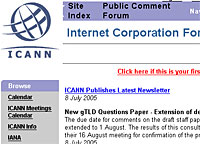 Consumers on the move will soon be able spot websites which have been specifically designed for mobile phones courtesy of the .mobi suffix.
Consumers on the move will soon be able spot websites which have been specifically designed for mobile phones courtesy of the .mobi suffix.
The new suffix, which we originally picked up on back in March 2004 was approved by the Internet Corporation for Assigned Names and Numbers (ICANN), will join the popular “.com”, “.org” and of course “.info”, and other top-level domain names when it goes live in 2006.
The new domain name was requested by a heavyweight gang of mobile phone operators and handset makers who teamed up to create a joint venture tasked with encouraging companies and Web site designers to create mobile-specific Web pages.
The member companies include Hutchison 3G, GSM., Ericsson, Microsoft, Nokia, Samsung, Telefonica Moviles, T-Mobile and Vodafone.
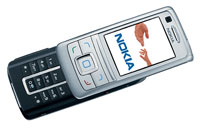 The companies hope that the new mobile-optimised websites will encourage consumers to upgrade their phones and access the web more while on the move – and thus generate lots of lovely lolly for their coffers.
The companies hope that the new mobile-optimised websites will encourage consumers to upgrade their phones and access the web more while on the move – and thus generate lots of lovely lolly for their coffers.
“As .mobi will encourage the usage of advanced functionalities in mobile devices, the market potential for those devices will increase,” the companies said in a joint statement.
For some old timer designers it’ll feel like being back in the mid 1990s with the new mobile sites having to take into account the small screens, limited memory and frugal bandwidth available on mobile phones.
Although the new suffix makes perfect sense for British babblers (who call their phones ‘mobiles’), it’s a little more confusing for the Finns, where mobile phones going under the curious name of “kannyka,” which sounds like something that Ali G may have come out with. Aye!
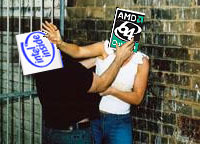 European Commission heavies made an unscheduled visit to Intel offices in Europe today as the chip maker’s offices were raided in connection with suspected anti-trust violations.
European Commission heavies made an unscheduled visit to Intel offices in Europe today as the chip maker’s offices were raided in connection with suspected anti-trust violations.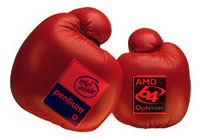 These requested information on government procurement tenders for computers containing requirements that they specify Intel chips or request a chip speed exclusive to Intel.
These requested information on government procurement tenders for computers containing requirements that they specify Intel chips or request a chip speed exclusive to Intel.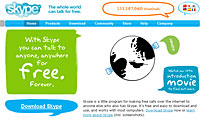 Boingo Wireless and Skype have fluttered eyelids at each other, gone for a quiet snog and, ruddy faced, jointly announced Skype Zones, a partnership that offers global Wi-Fi access to Skype customers at (ahem) “revolutionary” prices.
Boingo Wireless and Skype have fluttered eyelids at each other, gone for a quiet snog and, ruddy faced, jointly announced Skype Zones, a partnership that offers global Wi-Fi access to Skype customers at (ahem) “revolutionary” prices. Fluffing up the big pink cushions of corporate love, Niklas Zennstrom, Skype CEO purred passionately about his new partner: “Boingo is a world-class company that offers Skype users unprecedented global communications mobility and accessibility, at an aggressive, market disrupting price.”
Fluffing up the big pink cushions of corporate love, Niklas Zennstrom, Skype CEO purred passionately about his new partner: “Boingo is a world-class company that offers Skype users unprecedented global communications mobility and accessibility, at an aggressive, market disrupting price.” Monthly access to Skype Zones is $7.95 per month for unlimited Skype access or $2.95 (~€2.42~£1.66) for a 2-hour connection.
Monthly access to Skype Zones is $7.95 per month for unlimited Skype access or $2.95 (~€2.42~£1.66) for a 2-hour connection.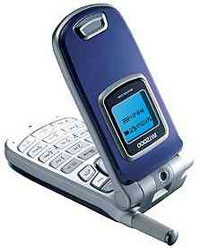 The growth of photo and video-capable phones has resulted in news agencies sourcing more and more content from members of the public who have used their mobiles to record disaster scenes.
The growth of photo and video-capable phones has resulted in news agencies sourcing more and more content from members of the public who have used their mobiles to record disaster scenes. Jonathan Klein, CNN’s U.S. chief believes this “citizen journalism” will become a more important part of coverage in major news events. “No question about it,” he said. “There’s been a lot of talk in terms of the increased democratization of the news media relating to blogs and the like. This is another example of the citizen journalist.”
Jonathan Klein, CNN’s U.S. chief believes this “citizen journalism” will become a more important part of coverage in major news events. “No question about it,” he said. “There’s been a lot of talk in terms of the increased democratization of the news media relating to blogs and the like. This is another example of the citizen journalist.”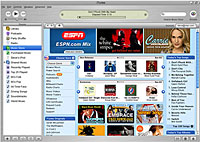 The Apple rumour mill has been cranking into overdrive over the weekend after Forbes reported that the company may be considering becoming a mobile phone operator.
The Apple rumour mill has been cranking into overdrive over the weekend after Forbes reported that the company may be considering becoming a mobile phone operator. However, a report in the Sunday Telegraph yesterday claimed that Motorola will finally “unveil the first fruits of its partnership with Apple next month with the launch of its iTunes mobile phone at the V Festival.” The festival runs from 20th to 21st August 2005.
However, a report in the Sunday Telegraph yesterday claimed that Motorola will finally “unveil the first fruits of its partnership with Apple next month with the launch of its iTunes mobile phone at the V Festival.” The festival runs from 20th to 21st August 2005. The UK record industry trade association the BPI has revealed that download sales in 2005 have raced past the ten-million mark – almost twice the amount for the whole of 2004.
The UK record industry trade association the BPI has revealed that download sales in 2005 have raced past the ten-million mark – almost twice the amount for the whole of 2004. Illegal music downloads remain a thorn in the side of the industry, but the growth in legal downloads now outstrips the growth in dodgy file sharing with Jamieson adding, “The battle against illegal files-haring will continue, but we are delighted to have hit this milestone so soon”.
Illegal music downloads remain a thorn in the side of the industry, but the growth in legal downloads now outstrips the growth in dodgy file sharing with Jamieson adding, “The battle against illegal files-haring will continue, but we are delighted to have hit this milestone so soon”.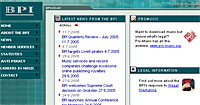 The resurgence of vinyl has been attributed to British indie and rock acts love affair with their near ancient format, with bands like Iron Maiden’s, Libertines, Babyshambles, Kaiser Chiefs and Franz Ferdinand all releasing songs on vinyl.
The resurgence of vinyl has been attributed to British indie and rock acts love affair with their near ancient format, with bands like Iron Maiden’s, Libertines, Babyshambles, Kaiser Chiefs and Franz Ferdinand all releasing songs on vinyl. New research from UK High Street bank Halifax reveals that over half of children between the ages of seven to sixteen years old have bought something over the Internet.
New research from UK High Street bank Halifax reveals that over half of children between the ages of seven to sixteen years old have bought something over the Internet. Not surprisingly, age plays a big part in who gets to shop online with less than a third of seven to eleven year olds (29%) clicking and buying compared to almost three quarters of twelve to sixteen year olds (73%).
Not surprisingly, age plays a big part in who gets to shop online with less than a third of seven to eleven year olds (29%) clicking and buying compared to almost three quarters of twelve to sixteen year olds (73%). Barging its way into the crowded 5 megapixel “super zoom” market is Sony’s new Cyber-shot DSC-H1 camera.
Barging its way into the crowded 5 megapixel “super zoom” market is Sony’s new Cyber-shot DSC-H1 camera.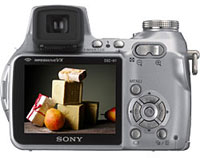 The DSC-H1 sports a fairly small but bright 115,200 pixels electronic viewfinder (EVF) that mirrors the information displayed on the main screen.
The DSC-H1 sports a fairly small but bright 115,200 pixels electronic viewfinder (EVF) that mirrors the information displayed on the main screen.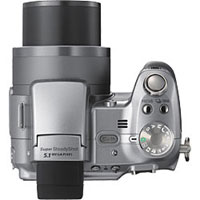 Shutter speeds range from 30 to 1/1000 second, and the camera comes with optical image stabilisation built in (although Sony likes to call it Super Steady Shot’).
Shutter speeds range from 30 to 1/1000 second, and the camera comes with optical image stabilisation built in (although Sony likes to call it Super Steady Shot’).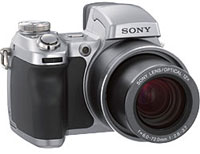 There’s enough manual controls to ensure that adventurous photographers can stay in control of their exposures, with a wide selection of scene modes covering most eventualities.
There’s enough manual controls to ensure that adventurous photographers can stay in control of their exposures, with a wide selection of scene modes covering most eventualities.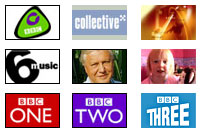 The BBC has announced a pilot scheme to premiere some new TV programmes before they are broadcast on over traditional channels.
The BBC has announced a pilot scheme to premiere some new TV programmes before they are broadcast on over traditional channels. Jana Bennett, The BBC’s Director of Television, said: “The broadband premiere of The Mighty Boosh is a significant step forward in offering our audiences even greater value in a changing television world.
Jana Bennett, The BBC’s Director of Television, said: “The broadband premiere of The Mighty Boosh is a significant step forward in offering our audiences even greater value in a changing television world. There’s something of a stampede starting up of companies ready and willing to experiment with video over broadband, with BT announcing that it planned to begin trials of
There’s something of a stampede starting up of companies ready and willing to experiment with video over broadband, with BT announcing that it planned to begin trials of 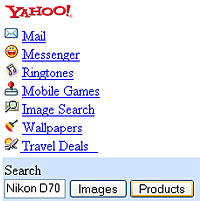 Yahoo! UK and Ireland have launched a handy new mobile search service which allows consumers to check the prices of goods via Yahoo! WAP services when they’re out and about.
Yahoo! UK and Ireland have launched a handy new mobile search service which allows consumers to check the prices of goods via Yahoo! WAP services when they’re out and about.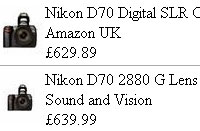 A result screen then displays images, pricing and product information, providing users with the low down about the cheapest prices around.
A result screen then displays images, pricing and product information, providing users with the low down about the cheapest prices around. However, if you persevere and click through to the next results page, a ‘compare’ link should magically appear under some products and this will let you access its full details.
However, if you persevere and click through to the next results page, a ‘compare’ link should magically appear under some products and this will let you access its full details.